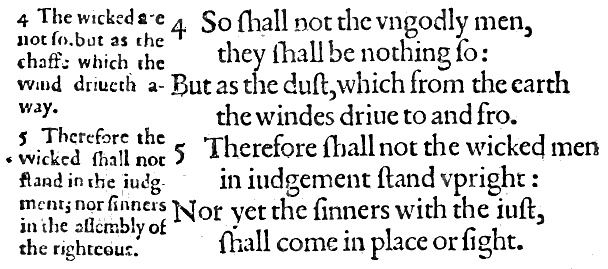Passing over hand-written texts, the reading of which is a whole other problem, one of the barriers to enjoying the literature of the sixteenth and earlier centuries is the apparently cavalier attitude to spelling.
There can be several elements to this:
I. The use of different characters from those we would now use,
for example, "u" in place of "v".
Very commonly, the letter u was printed where we would now use the letter v, for example:
"There was neuer any thing by the wit of man so well deuised ... as ... diuine seruise."
and in modern spelling:
"There was never any thing by the wit of man so well devised ... as ... divine service."
This can get harder to read when the same word also includes an extra "u" next to another vowel, for example:
"... and the remnaunte tooke his seruauntes, and intreated them shamefully."
becomes:
"... and the remnant took his servants and [in]treated them shamefully."
Another common change is for the letter "i" to be used in place of a "j":
"... yet am I not therby iustified. It is the Lord that iudgeth me. Therfore iudge nothing before the tyme."
but don't expect consistency. In the same passage "judge" is also spelled the modern way.
Incidentally, in documents that included lower case Roman numerals, you can find the letter "j" used in place of the final "i", so i, ij, iij, iiij for 1, 2, 3, 4.
Perhaps the most daunting for the modern reader is the "ſ" character that looks so like an f, and was used in place of an "s", except at the end of words.

This image is from the 1618 printing of The Whole Booke of Psalms, showing the prose psalms in the left margin alongside the metrical version. Often printing flaws and aged paper make it very difficult to see whether the character is an "ſ" or an "f". The final word in the passage above, for example might be "sight" or "fight". (It's "sight". I checked.)
II. The use of contractions
The easiest contraction to understand has become a modern cliché: ye, used for "the" (as in Ye Olde Englishe Tea Shoppe). It's pretty easy to guess from this that yt represents "that".
Incidentally, the use of the letter "y" in ye and yt comes from early printing where "y" was commonly used to represent the thorn character þ (which was pronounced "th", not "yuh").
The second type of contraction is where "the" is trucated to th and joined onto the following word (where this begins with a vowel), so "The Emperor" becomes Themperor, "The Ascension" becomes Thascension. Sometimes it's a little harder to understand: Thinglyshe", for example, stands for "The Inglyshe" (The English). Contractions like this do not necessarily start with a capital, so you will not always get that clue.
The final sort of contraction is indicated by a horizontal line over a vowel. This indicates that an "m" or an "n" has been omitted. So, for example:
| cōmaundemēte |
= |
commaundemente |
| upō |
= |
upon |
| frō |
= |
from |
| amōg |
= |
among |
| mā |
= |
man |
| nōbre |
= |
nombre |
| sōg |
= |
song |

Metal type in a composing stick, resting on a type case
I found a great deal of this sort of contraction in the printed copy of The Whole Book of Psalms. I have a suspicion that it is a typesetter's work-around.
Imagine you have set a whole page of text — done by placing individual metal characters into a composing stick (in mirror-image of course!). When the page is proof-read, you find that you have missed out a whole word. If it is a short word, you might get away with reducing the gaps between the words on one line. If this will not work, your only options are to re-set the whole page (which might affect subsequent pages that have already been set) or to squeeze the word in by abbreviating elsewhere.
Incidentally, in my Kindle edition of The Whole Book of Psalmes I expanded the contractions in the chart above.
III. Wildly different spelling
Consistent spelling did not become the norm until the late nineteenth to early twentieth century. The further back in history you go the more "phonetic" is the spelling. People wrote what they heard, so someone in the north of England might spell words (and names) differently from someone brought up in the south. This can have its advantages — pronouncing the words phonetically gives you a clue as to the sound of speech in that era.
Two letters follow, both from Henry VII. The first is a matter of state, giving instructions to a subordinate:
Trusty and welbeloved, We grete you wele. And have herde to our great displeaser, that, for a certain variance and controversie depending betwix you on the oon partie and Sir John Fortescu on the othr, ye entende with unliefull [unlawful] assembles and conventicles of our people to be at the Sessions next to be holden within our Countie of Hertford, to thaffraying of our Peas, [Peace] and distourbance of the same Sessions, which we ne wold, in eschueing such trouble and inconvenients that by likelyhode might therupon ensue. Wherfore we write unto you at this tyme, commanding you in the straitest wise, that, leving the said assembles, ye forber to bee at the said Sessions, and neither doo ner procure to be doon any thing there, privately or apertely, repugnant to the equitie of our Lawes or rupture of our said Peas, at your uttermost perell. And also that immediatly after the sight hereof ye addresse you unto our presence, to knowe our further mynde and pleasur in the
premesses [premises]. Lating you wite [Letting you know] that we have writen in like wise herein to the said Sir John. Yeven [Given] under our Signet at our paloys [palace] of Westminster the xxiij day of February.
[Letter from Henry VII to Sir William Say.]
This second letter is a personal one, from Henry to his mother, Margaret, and his natural style of speech comes through more clearly:
Madam, my most enterely wilbeloved Lady and Moder, I recommende me unto you in the most humble and lauly [lowly] wise that I can, beseeching you of your dayly and continuall blessings. By your Confessour the berrer [bearer] I have reseived your good and most loving wryting, and by the same have herde at good leisure such credense as he would shewe unto me on your behalf, and thereupon have spedde him in every behalve withowte delai according to yowr noble petition and desire, which restith in two principall poynts: the one for a generall pardon for all manner causes: the other is for to altre and chaunge part of a Lycense which I had gyven unto you before for to be put into mortmain at Westmynster; and now to be converted into the University of Cambridge for your Soule helthe, &c. All which thyngs according to your desire and plesure I have with all my herte and goode wille giffen and graunted unto you. And my Dame, not onely in this but in all other thyngs that I may knowe should be to youre honour and plesure and weale of youre salle
[soul] I shall be as glad to plese you as youre herte can desire hit, and I knowe welle that I am as much bounden so to doe as any creture lyvyng, for the grete and singular moderly love and affection that hit hath plesed you at all tymes to ber [bear] towards me.
In this second letter, above, you can see an example of how the same writer, in the same document, can spell the same word in different ways: "I had gyven" and "goode wille giffen"
Compare now the beginning of Margaret's reply:
My oune suet [own sweet] and most deere Kynge and all my worldly joy, yn as humble maner as y can thynke y recommand me to your Grace, and moste hertely beseche our lord to blesse you; and my good herte wher that you sa [say] that the Frenshe Kyng hathe at thys tyme gevyn me courteyse answer...
Margaret consistently uses "y" in place of "i".
This next extract is from a letter to Henry VIII, so some years later:
The forsaid newis were so joyfull unto us your Gracis subgetts here, that we desired of the King of Arragon to know what certaynte he had thereof, which aunswerd that he did know nothing thereof; but, aftyr thre daiys, when the same dyd more largeli encrease, he shewid unto us that he was enformed owte of Fraunce that the Frensh King gave in expresse commaundement to the Capitains of his Navye, that, in case thei were not able to have the ovyrhand of th'englishmen, that thei shulde rather fyer thaire owen shippes then suffre them to be taken; wherein his meanyng was, bi all that I cowde perceyve, that if there were any shippes distroied of the Frensh Flete, that yt was doone by themself, because of the commaundement of thair King, and not by your Graces royall Armye.
[Doctor Knight to King Henry the VIIIth upon the King of Arragon's truce with France... A.D. 1513.]
"Newis" and "shewid" — for "news" and "showed" — suggests that the words were pronounced as two syllables, whilst "aunswerd" suggests that, apart from a lengthened initial syllable, the writer pronounced this word as we would today (ie, two syllables, not three).
Basically, my rule of thumb for making sense of words that are not immediately understandable is to say the word aloud. Often that, with the context, is enough to trigger the sense. If you are still stuck ... try looking it up in Webster's Dictionary (https://www.merriam-webster.com), or the Oxford English Dictionary. It may be that the word (or that sense of the word) has become obsolete — one that puzzled me was the use of the word "reins", where the context was nothing to do with horses. It turns out that the word was used for "kidneys", and for the seat of the passions.

